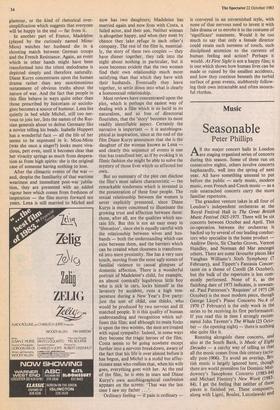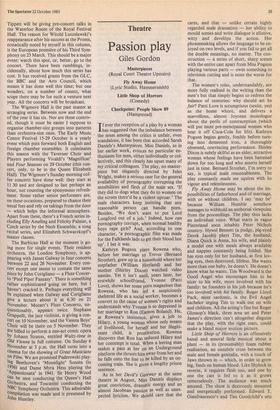Mu sic
Seasonable
Peter Phillips
A11 the major concert halls in London are staging organised series of concerts during this season. Some of these run on consecutive nights, others involve concerts haphazardly, well into the spring of next year. All have something unusual to put before the public — early music, modern music, even French and Czech music — as a rule unattached concerts carry the more familiar repertoire.
The grandest venture takes in all four of London's independent orchestras at the Royal Festival Hall in The Great British Music Festival 1925-1975. There will be six concerts between October and April. This co-operation between the orchestras is backed up by several of our leading conduc- tors who specialise in the home product — Andrew Davis, Sir Charles Groves, Vernon Handley, and Norman del Mar amongst others. There are some favourite pieces like Vaughan Williams's Sixth Symphony (7 February), and Tippett's Fantasia Concer- tante on a theme of Corelli (26 October), but the bulk of the repertoire is less com- monly performed. None of it, as the finishing date of 1975 indicates, is unwean- ed. Paul Patterson's 'Requiem' of 1975 (26 October) is the most modern piece, though George Lloyd's Piano Concerto No.4 of 1970 (7 February) is the only work in the series to be receiving its first performance. If you read this in time I strongly recom- mend John Tavener's The Whale (23 Octo- ber — the opening night) — there is nothing else quite like it. Running alongside these concerts, and also at the South Bank, is Music of Eight Decades — a catchy way of telling us that all the music comes from this century (actu- ally post-1906). To avoid an overlap, Bri- tish music is largely ignored here, though there are world premieres for Dominic Mut' downey's Saxophone Concerto (1983-84) and Michael Finnissy's New Work (1983- 84). I get the feeling that neither of these pieces is finished yet. These composers, along with Ligeti, Boulez, Lutoslawski and
Tippett will be giving pre-concert talks in the Waterloo Room of the Royal Festival Hall. The reason for Witold Lutoslawski's reappearance after his success at the Proms, ecstatically noted by myself in this column, is the European premiere of his Third Sym- phony on 23 March. This should be a major event: watch this spot, or, better, go to the concert. There have been rumblings, in- cidentally, about how much this series has cost. It has received grants from the GLC, the BBC and the Arts Council, which means it has done well this time; but one wonders, on a number of counts, what scope there may be for such a venture next year. All the concerts will be broadcast.
The Wigmore Hall is the past master at arranging series. Between now and the end of the year it has six. Nor are these contriv- ed, though it must be easier I suppose to organise chamber-size groups into patterns than orchestra-size ones. The Early Music Centre Festival 15-29 October is a yearly event which puts forward both English and foreign chamber ensembles. It culminates this season with the Taverner Choir and Players performing Vivaldi's 'Magnificat' and Four Seasons on 29 October (this con- cert, only, to be in the Queen Elizabeth Hall). The Wigmore's Sunday morning cof- fee concerts have done well: they start at 11.30 and are designed to last perhaps an hour, not counting the eponymous refresh- ment. Some rather senior performers are, on these occasions, prepared to chance their usual fees and rely on takings from the door — which helps the informal atmosphere. Apart from these, there's a French series in- cluding Elly Ameling and Felicity Palmer, a Czech series by the Nash Ensemble, a song recital series, and Elizabeth Schwarzkoprs master classes.
The Barbican Hall at the moment is go- ing more for single events. Their resident orchestra, the London Symphony, is ap- Pearing with James Galway in four concerts between 22 and 26 November. Every con- cert except one seems to contain the same Piece by John Corigliano — a Flute Concer- to 'Pied Piper Fantasy'. There is something rather sophisticated going on here, but I haven't cracked it. Perhaps everything will be explained when Galway and Corigliano give a lecture about it at 6.30 on 21 November. Mozart's Flute Concerto, un- questionably, appears twice. Stephane Grappelli, the jazz violinist, is giving a con- cert on 10 November, and the Vienna Boys' Choir will be there on 5 November. They are billed to perform a one-act comic opera by Johann Strauss, entitled Waltz-time in Old Vienna in full costume. On Sunday 6 November at 3 p.m. the Hall turns into a cinema for the showing of Great Musicians ?n Film. We are promised Paderewski play- ing Beethoven's 'Moonlight' Sonata (in ,1936) and Dame Myra Hess playing the APpassionata' in 1941. Sir Henry Wood can be seen conducting the Queen's Hall Orchestra, and Toscanini conducting the NBC Symphony Orchestra. This admirable compilation was made and is presented by John Huntley.















































 Previous page
Previous page